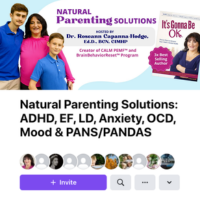As a parent, you want nothing more than to see your child thrive and overcome the unique challenges they face. If your child is struggling with clinical issues such as ADHD, anxiety, OCD, depression, or other mental health conditions, you understand just how important it is to support their well-being in every way possible.
One key factor in managing these conditions is supporting healthy neurotransmitter function. Neurotransmitters are chemical messengers that have a significant impact on mood, attention, and behavior. When there are imbalances in these chemical messengers, it can contribute to the symptoms of clinical issues.
While many take prescription medication such as selective serotonin reuptake inhibitors (SSRIs) to address clinical issues such as anxiety, seasonal affective disorder (SAD), depression, OCD and even ADHD, these psychiatric medications have dangerous side effects, some even creating long term problems. These medications can harm the brain and parents should be concerned.
But there's good news. There are many natural ways to support healthy neurotransmitter function in children and teens. By making simple changes to your child's diet, lifestyle, and routine, you can help improve their neurotransmitter levels and promote optimal mental health.
Remember, you're not alone on this journey, and there is hope for your child's future. With this knowledge and these natural methods and tools, you can empower your child to manage their clinical issues and live a happy, healthy, and balanced life. Learning how to increase neurotransmitters naturally in children and teens can help your entire family too!
Neurotransmitter 101 for Parents
As a parent, you want the best for your child's mental and emotional well-being. One important factor in supporting healthy brain function is understanding the role of neurotransmitters.
Neurotransmitters are chemicals that transmit signals between neurons, or nerve cells, in the brain. They play a critical role in regulating mood, behavior, attention, and other important functions. There are several types of neurotransmitters, including:
1. Dopamine: Involved in regulating motivation, reward, pleasure, and movement.
2. Serotonin: Regulates mood, appetite, and sleep.
3. Norepinephrine: Involved in the “fight or flight” response, attention, and focus.
4. GABA: Acts as a natural tranquilizer and helps regulate anxiety.
5. Glutamate: Involved in learning, memory, and brain development.
Neurotransmitters are synthesized from amino acids, which are obtained from the diet. Therefore, consuming a diet that is rich in protein and other essential nutrients is crucial for supporting healthy neurotransmitter function. In addition, lifestyle factors such as sleep, physical activity, and stress management can also play a role in neurotransmitter regulation.
Imbalances in neurotransmitters can contribute to a variety of mental health conditions, including depression, anxiety, ADHD, and others. However, with the right knowledge and tools, parents can support healthy neurotransmitter function in their children and promote optimal mental and emotional well-being.
What are the Seven Main Types of Neurotransmitters and How Do They Affect Behavior and Mental Health?

As a parent of a child or teen with mental health, behavioral, or neurodevelopmental disorders, it's important to understand the role that neurotransmitters play in the brain and how imbalances can contribute to your child's symptoms. Neurotransmitters are the communication system of the brain and the body and are impacted by way more than genetics.
There are seven main types of neurotransmitters, and each has a unique function that affects behavior and mental health.
1. Serotonin: Serotonin is a neurotransmitter that regulates mood, appetite, and sleep. Low levels of serotonin have been linked to depression, anxiety, and obsessive-compulsive disorder (OCD). In children, low serotonin levels may manifest as irritability, aggression, and impulsivity.
2. Dopamine: Dopamine is a neurotransmitter that regulates pleasure, motivation, and reward. Low levels of dopamine have been linked to depression, ADHD, and addiction. In children, low dopamine levels may manifest as apathy, lack of motivation, and difficulty with attention and focus.
3. GABA: GABA is a neurotransmitter that inhibits brain activity, promoting relaxation and calmness. Low levels of GABA have been linked to anxiety, depression, and ADHD. In children, low GABA levels may manifest as restlessness, anxiety, and difficulty with sleep.
4. Glutamate: Glutamate is a neurotransmitter that stimulates brain activity, promoting learning and memory. High levels of glutamate have been linked to anxiety, OCD, and addiction. In children, high glutamate levels may manifest as hyperactivity, impulsivity, and aggression.
5. Norepinephrine: Norepinephrine is a neurotransmitter that regulates attention, arousal, and mood. Low levels of norepinephrine have been linked to depression and ADHD. In children, low norepinephrine levels may manifest as fatigue, lack of focus, and difficulty with motivation.
6. Acetylcholine: Acetylcholine is a neurotransmitter that regulates attention, learning, and memory. Low levels of acetylcholine have been linked to Alzheimer's disease and dementia. In children, low acetylcholine levels may manifest as difficulty with attention and focus, and difficulty with learning and memory.
7. Histamine: Histamine is a neurotransmitter that regulates wakefulness, attention, and mood. High levels of histamine have been linked to anxiety, ADHD, and insomnia. In children, high histamine levels may manifest as hyperactivity, impulsivity, and difficulty with sleep.
Understanding the role of neurotransmitters in behavior and mental health can help parents better understand their child's symptoms and treatment options. It can also help you understand that your child isn’t acting like this on purpose and at the same time feel empowered by all the ways parenting and lifestyle can positively affect neurotransmitters.
What Can Cause Low Levels of Neurotransmitters?
As a parent, it's important to understand the potential causes of low neurotransmitter levels in your child. When neurotransmitter levels are imbalanced, it can lead to a variety of symptoms and mental health conditions.
Here are some common causes of low levels of neurotransmitters in children and teens:
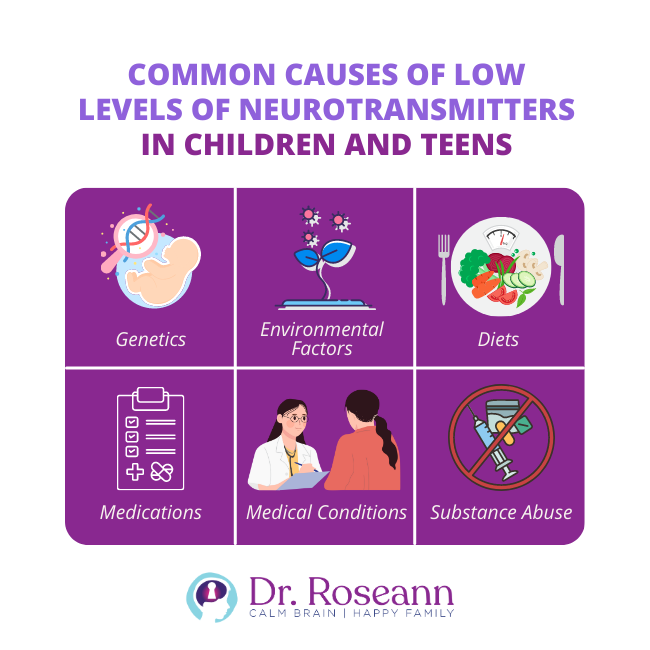
Genetics: Some children may have genetic variations that affect their ability to produce or use certain neurotransmitters, leading to imbalances.
Environmental factors: Exposure to environmental toxins, chronic stress, and other environmental factors can affect neurotransmitter production and function.
Diet: Nutritional deficiencies, such as low levels of vitamins and minerals, can affect neurotransmitter function. For example, low levels of the amino acid tryptophan can lead to low levels of serotonin.
Medications: Certain medications, such as antidepressants and antipsychotics, work by affecting neurotransmitter levels. However, long-term use of these medications can sometimes lead to imbalances in neurotransmitter levels.
Medical conditions: Certain medical conditions, such as Parkinson's disease, multiple sclerosis, and Alzheimer's disease, can affect neurotransmitter levels. Additionally, chronic stress and inflammation can also affect neurotransmitter function.
Substance abuse: Substance abuse can affect neurotransmitter function by altering the brain's reward system and dopamine levels. Chronic substance abuse can lead to long-term imbalances in neurotransmitter levels.
It's important to note that the causes of low neurotransmitter levels can be complex and multifactorial. Treatment may involve a combination of supplements and lifestyle changes to help restore healthy neurotransmitter function and promote positive mental health.
What are Signs of Low Neurotransmitter Levels in Children and Teens?
Low neurotransmitter levels in children and teens can affect their behavior, mood, and overall mental health. As a parent, it's important to be aware of the signs of low neurotransmitter levels so you can get to the right solutions.
Here's a list of some common signs of low neurotransmitter levels in children and teens that parents should look for:
Mood changes: depression, anxiety, irritability, or mood swings.
Sleep disturbances: difficulty falling asleep or staying asleep, nightmares or night terrors, or difficulty waking up in the morning.
Behavioral issues: difficulty with concentration, impulsivity, hyperactivity, fidgeting, difficulty with impulse control, and difficulty with organization.
Changes in appetite: changes in eating habits, increased cravings for carbohydrates or sweet foods, and weight gain or weight loss.
Fatigue: feelings of fatigue, lack of motivation, and low energy, tired or sluggish throughout the day.
It's important to note that these symptoms can also be caused by other factors and may not
necessarily indicate a neurotransmitter imbalance. Looking at all the factors impacting your child’s behavior is part of what we do in our one-to-one BrainBehaviorReset™ Program where you get to work with me and our amazing team.
The Science Behind Serotonin: How Amino Acids and Nerve Cells Affect Your Child's Well-Being
You want the best for your child’s mental and emotional health but may not know the path to that. One important factor in achieving this is supporting healthy neurotransmitter function, specifically increasing serotonin levels naturally. Serotonin is a neurotransmitter that plays a crucial role in regulating mood, appetite, and sleep. When serotonin levels are low, it can contribute to symptoms of anxiety, OCD, attention and mood.
Amino acids are the building blocks of protein and play an important role in the synthesis of neurotransmitters, which are chemical messengers that regulate various functions in the brain, including mood, sleep, appetite, and cognition. Some amino acids, such as tryptophan and tyrosine, are particularly important for the synthesis of neurotransmitters like serotonin and dopamine.
One way to increase serotonin levels naturally is by consuming foods that are rich in amino acids, such as tryptophan. Tryptophan is an essential amino acid that is necessary for serotonin synthesis. Foods such as turkey, chicken, eggs, and tofu are great sources of tryptophan.
Studies have also shown that exercise, particularly aerobic exercise, can increase serotonin levels in the brain. Exercise has been shown to promote the growth of nerve cells in the hippocampus, an area of the brain that is involved in regulating mood and memory.
Additionally, reducing stress and improving sleep can also help increase serotonin levels naturally. Chronic stress and poor sleep can contribute to a decrease in serotonin levels in the brain.
Studies have also found that increasing levels of dopamine can also improve mood and promote a sense of well-being. Dopamine is involved in regulating motivation, reward, pleasure, and movement. Foods such as fish, poultry, nuts, and beans are rich in the amino acid tyrosine, which is necessary for dopamine synthesis.
Increasing dopamine and serotonin levels naturally can help improve mood, reduce anxiety and depression, and promote a sense of well-being. By incorporating amino acid-rich foods, exercise, stress reduction techniques, and good sleep hygiene, parents can help support their child's healthy neurotransmitter function and overall mental health.
How Can I Increase My Neurotransmitters Naturally?
As a parent, you want to do everything you can to support your child's mental health and well-being. Neurotransmitters play a vital role in regulating brain function and affecting mood, behavior, and overall mental health. When neurotransmitter levels are imbalanced, it can lead to a range of mental health issues, including depression, anxiety, and attention disorders.
Fortunately, there are several natural ways that you can help support healthy neurotransmitter function in your child, without the need for medication. Let’s explore some effective and practical ways to increase neurotransmitters naturally, and promote positive mental health in your child.
90 Natural Ways to Increase Neurotransmitters in Children and Teens
1. Get regular exercise
2. Spend time in nature
3. Practice deep breathing exercises to increase serotonin levels
4. Get enough sleep
5. Use CALM PEMF™
6. Use positive parenting techniques
7. Eat a healthy, balanced diet
8. Avoid processed foods and sugar
9. Consume protein rich foods, like fish and eggs
10. Incorporate omega-3 fatty acids into your diet through fatty fish, nuts, and seeds
11. Consume foods high in antioxidants, like berries and leafy greens
12. Eat a diet rich in protein, complex carbohydrates, and essential nutrients
13. Consume foods high in tryptophan, such as turkey, chicken, eggs, and bananas
14. Incorporate omega-3 fatty acids into your diet through fatty fish, nuts, and seeds
15. Eat foods high in B vitamins, such as whole grains and leafy greens
16. Get regular exposure to sunlight
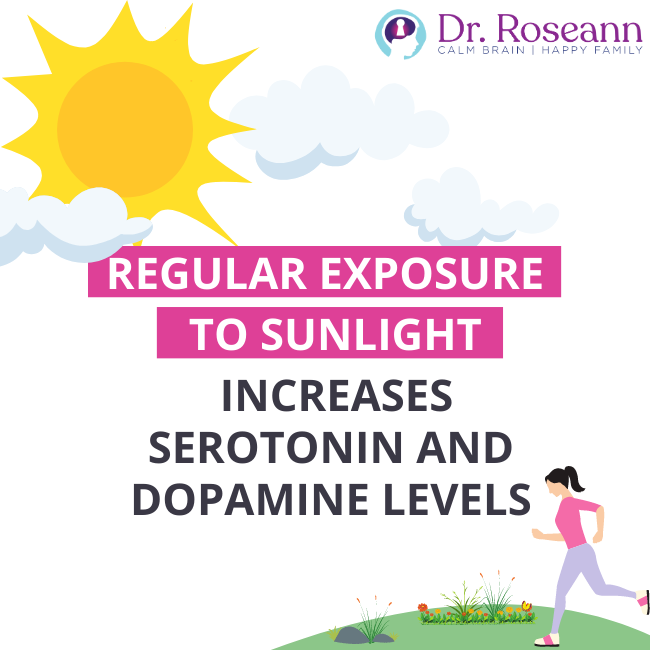
17. Consider taking vitamin D supplements
18. Take a high-quality multivitamin
19. Increase your intake of vitamin B6
20. Increase your intake of vitamin B12
21. Increase your intake of folate
22. Increase your intake of vitamin C
23. Increase your intake of magnesium
24. Increase your intake of iron
25. Incorporate probiotic supplements into your diet to support gut health, which can affect neurotransmitter production
26. Take adaptogenic herbs like ashwagandha or ginseng
27. Drink green tea or matcha
28. Eat dark chocolate in moderation
29. Take probiotics or eat fermented foods
30. Practice intermittent fasting or time-restricted eating
31. Practice mindfulness activities such as a nature walk
32. Spend time with loved ones to boost oxytocin levels.
33. Volunteer or engage in acts of kindness to boost oxytocin levels.
34. Practice gratitude
35. Seek therapy or counseling
36. Take up a hobby or activity you enjoy
37. Try aromatherapy with scents such as lavender, which can increase serotonin levels
38. Listen to music to increase dopamine levels
39. Use a trampoline
40. Try guided imagery exercises to promote relaxation and increase GABA levels
41. Give high fives when they do something kind or positive
42. Use a weighted blanket
43. Give a hug
44. Get a massage
45. Limit exposure to toxins and chemicals
46. Try essential oils such as peppermint or lemon to increase dopamine levels
47. Practice stress management techniques, like journaling or coloring
48. Use a grounding mat or device where they sleep
49. Take a cold shower or bath to stimulate cellular activity
50. Laugh and have fun to increase dopamine levels.
51. Smile at people
52. Take up a creative hobby, like painting or music
53. Practice self-care, like taking a bubble bath or getting a manicure
54. Take a hot bath to increase serotonin levels.
55. Try a new type of exercise or physical activity
56. Take up gardening or spending time outdoors
57. Try cognitive-behavioral therapy
58. Give a complement
59. Practice gratitude to increase serotonin levels
60. Practice visualization or guided imagery
61. Remove clutter and create a calm space
62. Practice acupressure or reflexology
63. Try biofeedback therapy
64. Use a breathing or meditation app
65. Engage in positive self-talk to increase dopamine levels
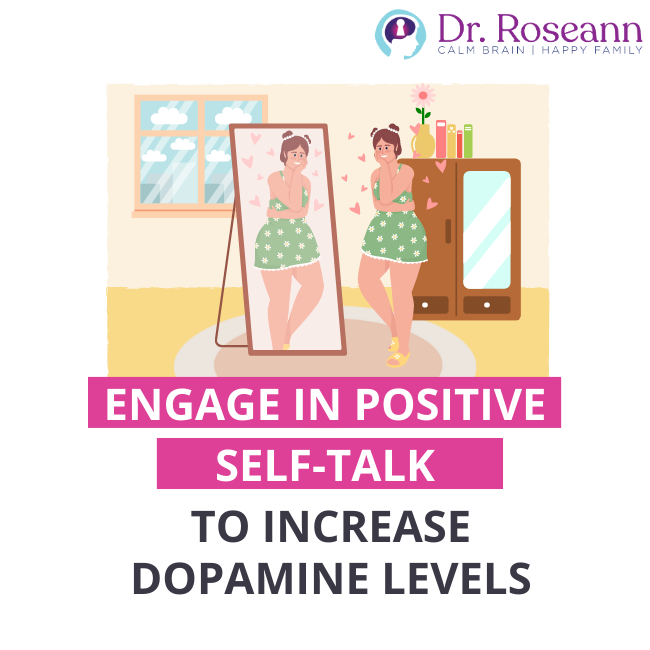
66. Practice progressive muscle relaxation
67. Practice self-compassion and self-love
68. Take up volunteering or community service or giving to others
69. Spend time in quiet or solitude
70. Do art and building activities
71. Take a technology break or social media detox
72. Take breaks throughout the day to reduce stress and increase dopamine levels.
73. Try cognitive-behavioral therapy to improve serotonin and dopamine levels.
74. Spend time in green spaces to reduce stress and improve overall well-being.
75. Spend time in prayer or spiritual practice
76. Use a foam roller or massage ball
77. Practice positive affirmations
78. Spend time with pets to increase oxytocin levels.
79. Dance or do other rhythmic activities
80. Take up a martial art or self-defense class
81. Practice and role model positive thinking
82. Take up a new hobby or skill, like cooking or learning a new language
83. Practice time management techniques to reduce stress
84. Practice progressive relaxation techniques where you tense and release body tension
85. Use color therapy or chromotherapy to boost mood
86. Spend time in a sensory garden or space
87. Engage in activities that bring joy and pleasure to increase dopamine levels.
88. Try yoga, which has been shown to increase GABA levels.
89. Talk about fun memories
90. Use neurofeedback to regulate the brain
How PEMF Can Increase Serotonin and Dopamine?
PEMF therapy is a non-invasive alternative therapy that uses pulsed electromagnetic fields to stimulate the brain and promote healing. Recent studies suggest that it can help increase both serotonin and dopamine levels in the brain by promoting their synthesis.
Serotonin and dopamine are neurotransmitters that play critical roles in regulating mood, motivation, reward, pleasure, and movement. Individuals with clinical mental health issues such as ADHD, anxiety, OCD, depression, and PANS/PANDAS may have imbalances in these neurotransmitters, leading to symptoms.
Studies have shown that PEMF therapy can increase tryptophan levels in the brain, which in turn leads to increased serotonin synthesis and improved mood regulation. Additionally, PEMF therapy has been shown to increase tyrosine levels in the brain, which can lead to increased dopamine synthesis.
PEMF therapy also promotes healthy brain function by increasing blood flow, reducing inflammation, and supporting cellular regeneration. PEMF is a promising alternative therapy that may offer benefits to children and teens with clinical mental health issues.
How Does Neurofeedback Improve The Balance of Neurotransmitters in the Brain?
If your child is struggling with clinical mental health issues like ADHD, anxiety, OCD, depression, or PANS/PANDAS, you may be wondering if there are alternative therapies that can help improve their symptoms. Neurofeedback is an exciting option that can offer hope for many families.
Neurofeedback works by training the brain to produce more of the desired brainwave patterns, leading to a reduction in behavior related to many mental health conditions. This innovative therapy has been shown to increase dopamine and serotonin levels, two neurotransmitters that play critical roles in regulating mood, motivation, reward, pleasure, and movement.
Research suggests that neurofeedback can enhance the function of dopamine-producing neurons in the brain, leading to improved motivation, focus, and attention. Additionally, it has been shown to improve the function of serotonin-producing neurons, leading to improved mood regulation and decreased anxiety. By improving brain function, neurofeedback can also lead to better communication between brain regions and overall better cognitive functioning.
Neurofeedback has been shown to affect neurotransmitters and is well researched therapy shown to improve mental health. Parents should consider this therapy for ADHD, learning disability, autism, anxiety, OCD, mood and depression, and PANS/PANDAS.
Why Improving Neurotransmitters Naturally in Children and Teens Important
There are several areas of the brain that are involved in regulating mood, behavior, and overall mental health. Two of the most important neurotransmitters in these areas are serotonin and dopamine. Serotonin is primarily found in the limbic system, which is responsible for regulating emotions, while dopamine is found in areas of the brain that are involved in reward and motivation.
Increasing serotonin levels naturally can have a profound effect on improving mood and reducing symptoms of depression and anxiety. One effective way to do this is by consuming foods that are rich in tryptophan, an amino acid that is essential for serotonin synthesis. Examples include turkey, chicken, eggs, and legumes. Additionally, spending time outdoors in natural light, regular exercise, and practicing mindfulness techniques have been shown to increase serotonin levels.
Similarly, increasing levels of dopamine can help regulate the reward and pleasure centers of the brain, improving motivation and overall well-being. One way to do this is by consuming foods that are rich in tyrosine, an amino acid that is necessary for dopamine synthesis. Examples include chicken, fish, dairy products, and almonds. Additionally, engaging in regular exercise and practicing stress-reducing techniques such as meditation and yoga can help increase dopamine levels naturally.
Studies show that probiotic supplements can also have a positive impact on neurotransmitter function and mental health. Probiotics help promote healthy gut flora, which has been linked to increased levels of serotonin and improved stress response.
It's important to note that while increasing neurotransmitters naturally can have significant benefits for improving mood and overall mental health, it's important to do so under the guidance of a healthcare professional. Additionally, some methods may have potential side effects or may not be suitable for everyone, so it's important to take a balanced and personalized approach.
In cases of seasonal affective disorder (SAD), a condition in which low levels of sunlight during the winter months can lead to depression and anxiety, light therapy can be an effective way to increase feel-good neurotransmitters naturally. This involves exposure to bright light for a specific amount of time each day and has been shown to improve symptoms in many individuals.
Taking a holistic approach that includes a combination of therapies and lifestyle changes can help support healthy neurotransmitter function in children and improve their overall well-being. In the long term, making these healthy lifestyle changes such as consuming a diet rich in amino acids, engaging in regular exercise, and practicing stress-reducing techniques can have a profound impact on increasing feel-good neurotransmitters naturally and improving overall mental health.
It's important to work with a healthcare provider and children's mental health professional to develop a personalized treatment plan that is tailored to your child's specific needs.
Want more resources to increase brain chemicals naturally? Grab my free eBook, The Ultimate Guide to Naturally Boosting Neurotransmitters in Children and Teens with ADHD, Anxiety, OCD, and Mood or Behavioral Problems
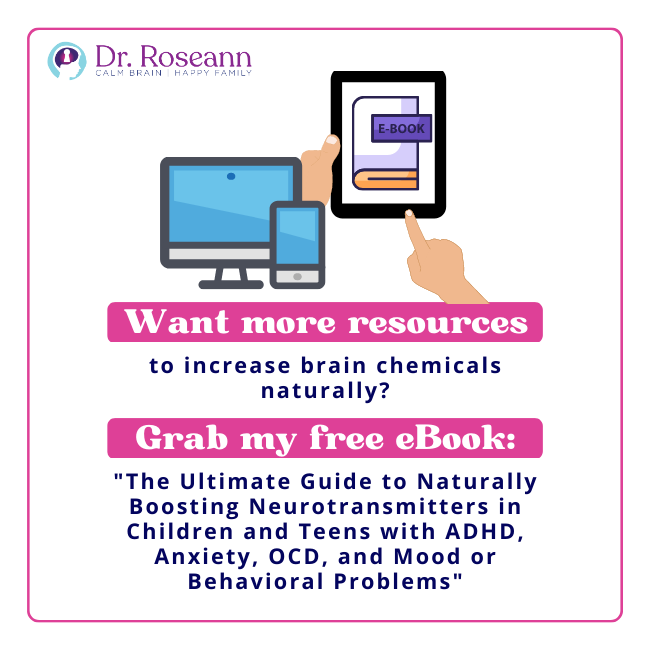

Always remember… “Calm Brain, Happy Family™”
Are you looking for SOLUTIONS for your struggling child or teen?
Dr. Roseann and her team are all about solutions, so you are in the right place!
There are 3 ways to work with Dr. Roseann:
You can get her books for parents and professionals, including: It’s Gonna Be OK™: Proven Ways to Improve Your Child’s Mental Health, Teletherapy Toolkit™ and Brain Under Attack: A Resource For Parents and Caregivers of Children With PANS, PANDAS, and Autoimmune Encephalopathy.
If you are a business or organization that needs proactive guidance to support employee mental health or an organization looking for a brand representative, check out Dr. Roseann’s media page and professional speaking page to see how we can work together.
Dr. Roseann is a Children’s Mental Health Expert and Therapist who has been featured in/on hundreds of media outlets including, CBS, NBC, FOX News, PIX11 NYC, The New York Times, The Washington Post,, Business Insider, USA Today, CNET, Marth Stewart, and PARENTS. FORBES called her, “A thought leader in children’s mental health.”

She is the founder and director of The Global Institute of Children’s Mental Health and Dr. Roseann Capanna-Hodge. Dr. Roseann is a Board Certified Neurofeedback (BCN) Practitioner, a Board Member of the Northeast Region Biofeedback Society (NRBS), Certified Integrative Medicine Mental Health Provider (CMHIMP) and an Amen Clinic Certified Brain Health Coach. She is also a member of The International Lyme Disease and Associated Disease Society (ILADS), The American Psychological Association (APA), Anxiety and Depression Association of America (ADAA) National Association of School Psychologists (NASP), International OCD Foundation (IOCDF) International Society for Neurofeedback and Research (ISNR) and The Association of Applied Psychophysiology and Biofeedback (AAPB).
© Roseann-Capanna-Hodge, LLC 2023
Disclaimer: This article is not intended to give health advice and it is recommended to consult with a physician before beginning any new wellness regime. *The effectiveness of diagnosis and treatment vary by patient and condition. Dr. Roseann Capanna-Hodge, LLC does not guarantee certain results.




